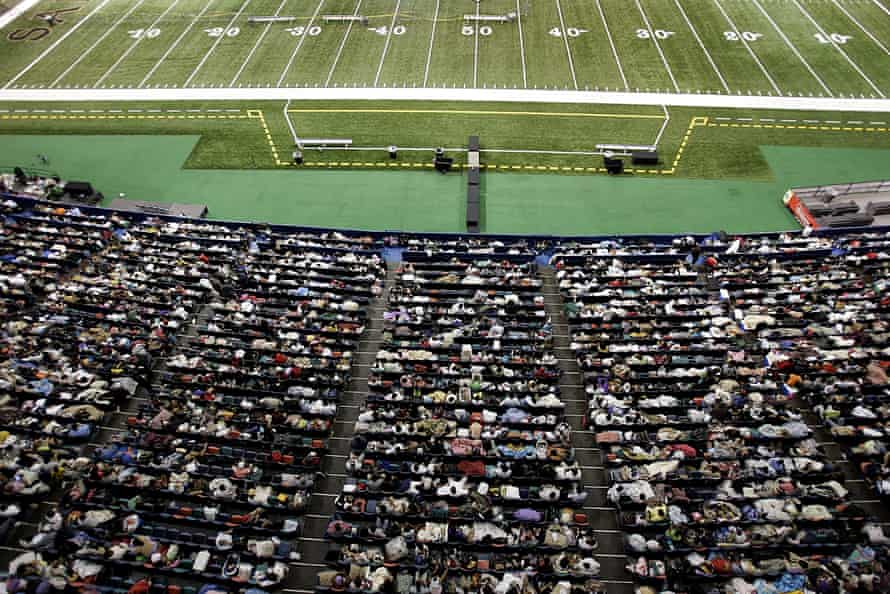The Katrina survivors who fled devastation only to freeze in Texas | Texas
Terrence Veal spent the better part of last week without water. After the pipes in his Houston home froze during the winter storm, he and his family quickly ran out of bottled water. Then the pipes burst, collapsing the ceiling and flooding the living room of the apartment he shares with his wife and two children and causing several thousand dollars’ worth of damage.
For Veal, this experience was all too familiar. He was just 23 in 2005 when he and his family fled New Orleans as Hurricane Katrina made its way toward the city. He expected to be gone several days, at most. What he didn’t expect was that he’d never live in New Orleans again. Months after the storm, Veal returned to survey the damage and found an empty shell where his home used to be.
“My entire life was washed away by the floods and it has never been the same, man,” he says.
Now approaching middle age, Veal has established a life for himself in Houston, first working as a FedEx driver and now as a school teacher, while moonlighting as a musician. Still, he feels far from safe in his new home. In 2017, he watched as the flood waters from Hurricane Harvey began to seep into his home in Houston. “I was just sitting there watching the water rise above my tires. Then it was up to my mailbox,” Veal says. He recalls wading out into the flooded street, searching for someone with a boat who could come and rescue his wife and children, who were trapped in the house.
In the days leading up to Katrina and in the weeks that followed, more than 1 million New Orleanians evacuated the city. Many drove to stay with family members or friends, spreading out across the region and the country. Others fled to nearby cities, where they quickly filled up hotels. Thousands more were unable to evacuate, including the nearly 25,000 who sheltered in the Superdome.

Like nearly 250,000 of their neighbors, Veal and his family ultimately settled in Houston, the closest major city to New Orleans and the center of the Federal Emergency Management Agency’s (Fema) recovery efforts. Twenty-three members of his extended family crowded into a two-bedroom, sustaining themselves on Veal’s credit card – their only available financial resource.
Almost two decades later, more than 30,000 former Katrina evacuees still live in Houston. Many of those who stayed did so because Houston offered better jobs and schools, as well as more affordable housing than New Orleans. Last year, the average income in Houston was almost $11,000 more than in New Orleans. Before the pandemic, unemployment rates in Houston hovered around 3.5%, compared with 5% in New Orleans.
Black New Orleanians, many of them close to the poverty line, made up the bulk of the evacuees who settled in Houston. They also experienced some of the largest growth in income in the years following Katrina. The average Black family in Houston makes about $47,000, compared with $31,000 in New Orleans.
But the impacts from Katrina still resurface – especially during extreme weather events like the freeze that struck much of Texas last month.
Terence Franklin settled in Houston with his family, after his home in the Gentilly neighborhood of New Orleans flooded. Franklin, now 51, managed to get a job working at a food bank run by another Katrina evacuee. For him, the most recent storm was just the latest reminder that extreme weather events were going to continue – and worsen – as the climate crisis intensifies.
While he has no plan to move his family, Franklin says Katrina instilled in him that a good home is not just somewhere with high incomes or good schools; it’s a place where you can survive a storm. “After Katrina, I asked myself: where in the US has the safest weather?” Franklin says. “My wife says there’s no safe place.”
Read More: The Katrina survivors who fled devastation only to freeze in Texas | Texas














